Analyzing Democracy in Organizations: Corporate Governance Perspective
VerifiedAdded on 2023/06/11
|9
|675
|433
Essay
AI Summary
This essay examines the concept of democracy within organizations, drawing parallels with democratic governance in countries and questioning why economic enterprises should not adopt similar principles. It highlights examples such as NRI Distribution and Breman Group, showcasing how em...
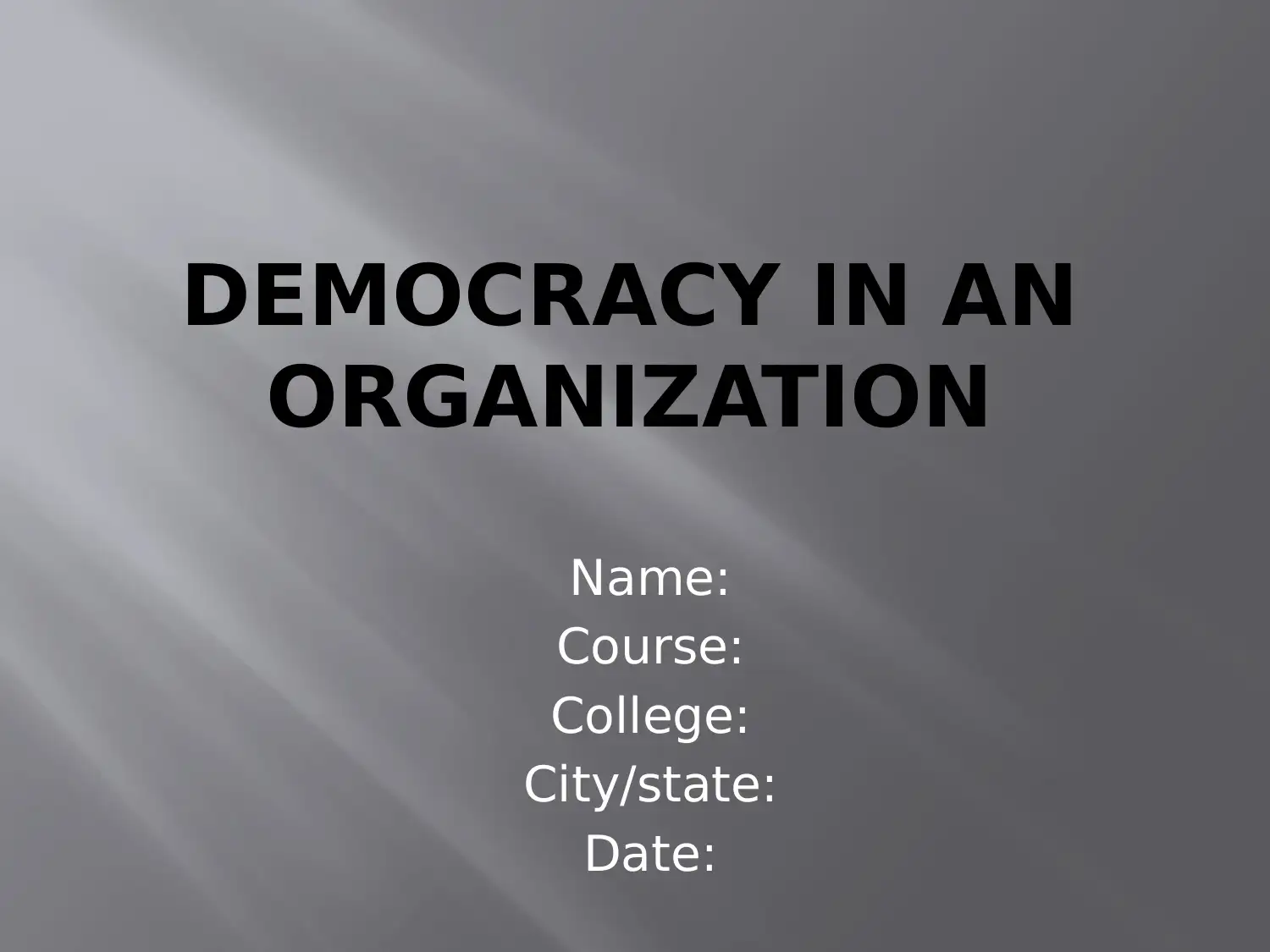
DEMOCRACY IN AN
ORGANIZATION
Name:
Course:
College:
City/state:
Date:
ORGANIZATION
Name:
Course:
College:
City/state:
Date:
Paraphrase This Document
Need a fresh take? Get an instant paraphrase of this document with our AI Paraphraser
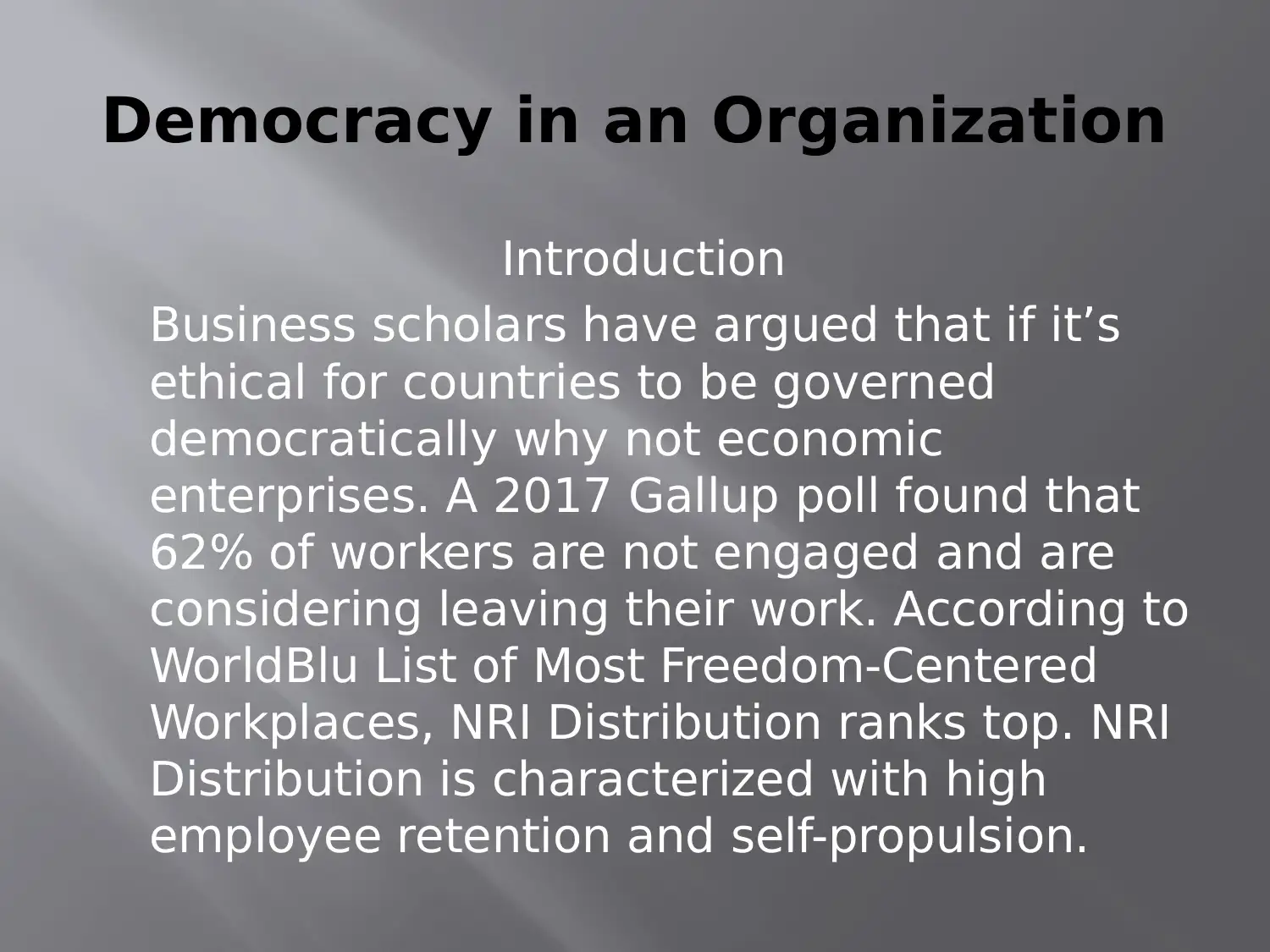
Democracy in an Organization
Introduction
Business scholars have argued that if it’s
ethical for countries to be governed
democratically why not economic
enterprises. A 2017 Gallup poll found that
62% of workers are not engaged and are
considering leaving their work. According to
WorldBlu List of Most Freedom-Centered
Workplaces, NRI Distribution ranks top. NRI
Distribution is characterized with high
employee retention and self-propulsion.
Introduction
Business scholars have argued that if it’s
ethical for countries to be governed
democratically why not economic
enterprises. A 2017 Gallup poll found that
62% of workers are not engaged and are
considering leaving their work. According to
WorldBlu List of Most Freedom-Centered
Workplaces, NRI Distribution ranks top. NRI
Distribution is characterized with high
employee retention and self-propulsion.
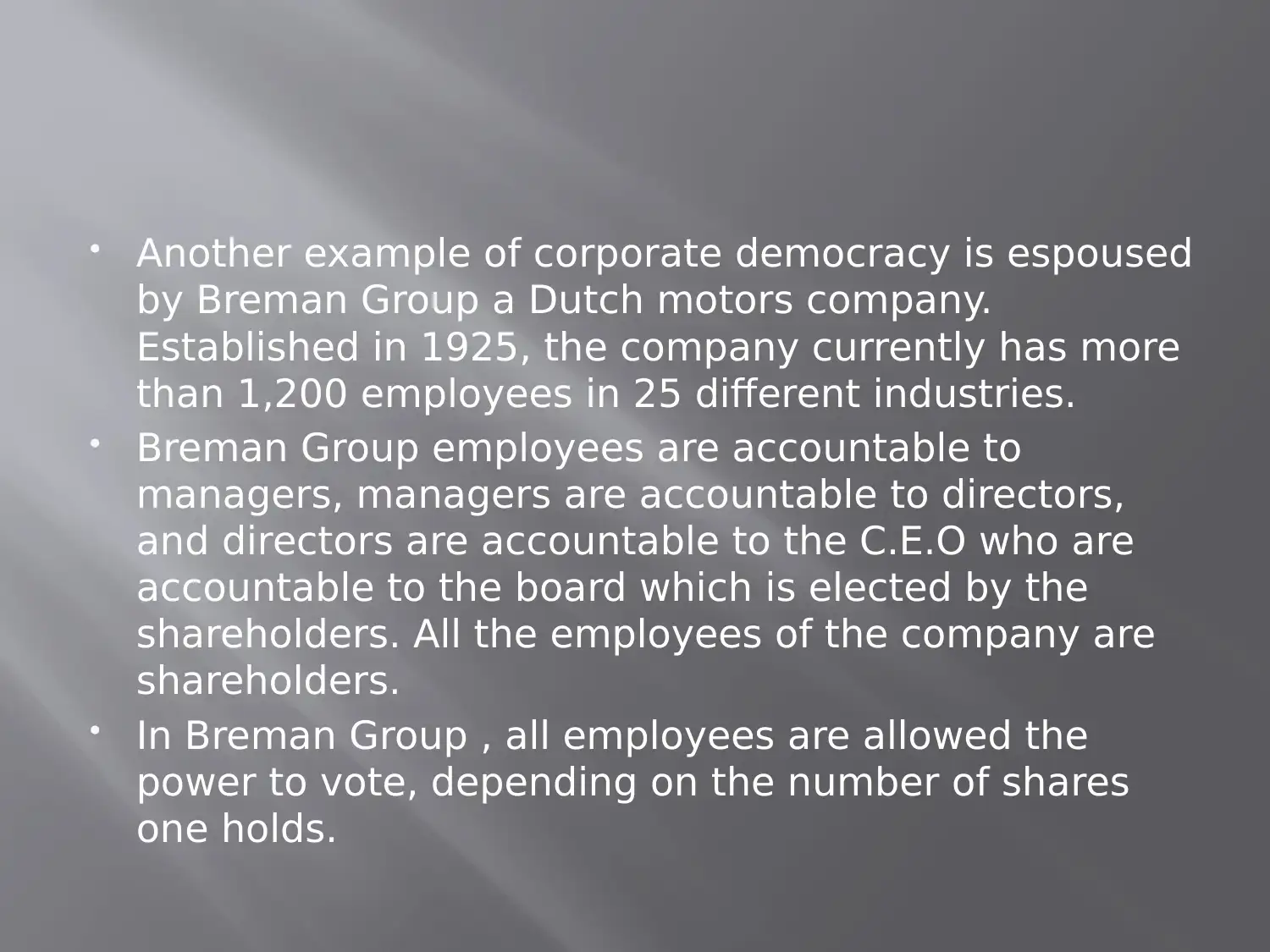
Another example of corporate democracy is espoused
by Breman Group a Dutch motors company.
Established in 1925, the company currently has more
than 1,200 employees in 25 different industries.
Breman Group employees are accountable to
managers, managers are accountable to directors,
and directors are accountable to the C.E.O who are
accountable to the board which is elected by the
shareholders. All the employees of the company are
shareholders.
In Breman Group , all employees are allowed the
power to vote, depending on the number of shares
one holds.
by Breman Group a Dutch motors company.
Established in 1925, the company currently has more
than 1,200 employees in 25 different industries.
Breman Group employees are accountable to
managers, managers are accountable to directors,
and directors are accountable to the C.E.O who are
accountable to the board which is elected by the
shareholders. All the employees of the company are
shareholders.
In Breman Group , all employees are allowed the
power to vote, depending on the number of shares
one holds.
⊘ This is a preview!⊘
Do you want full access?
Subscribe today to unlock all pages.

Trusted by 1+ million students worldwide
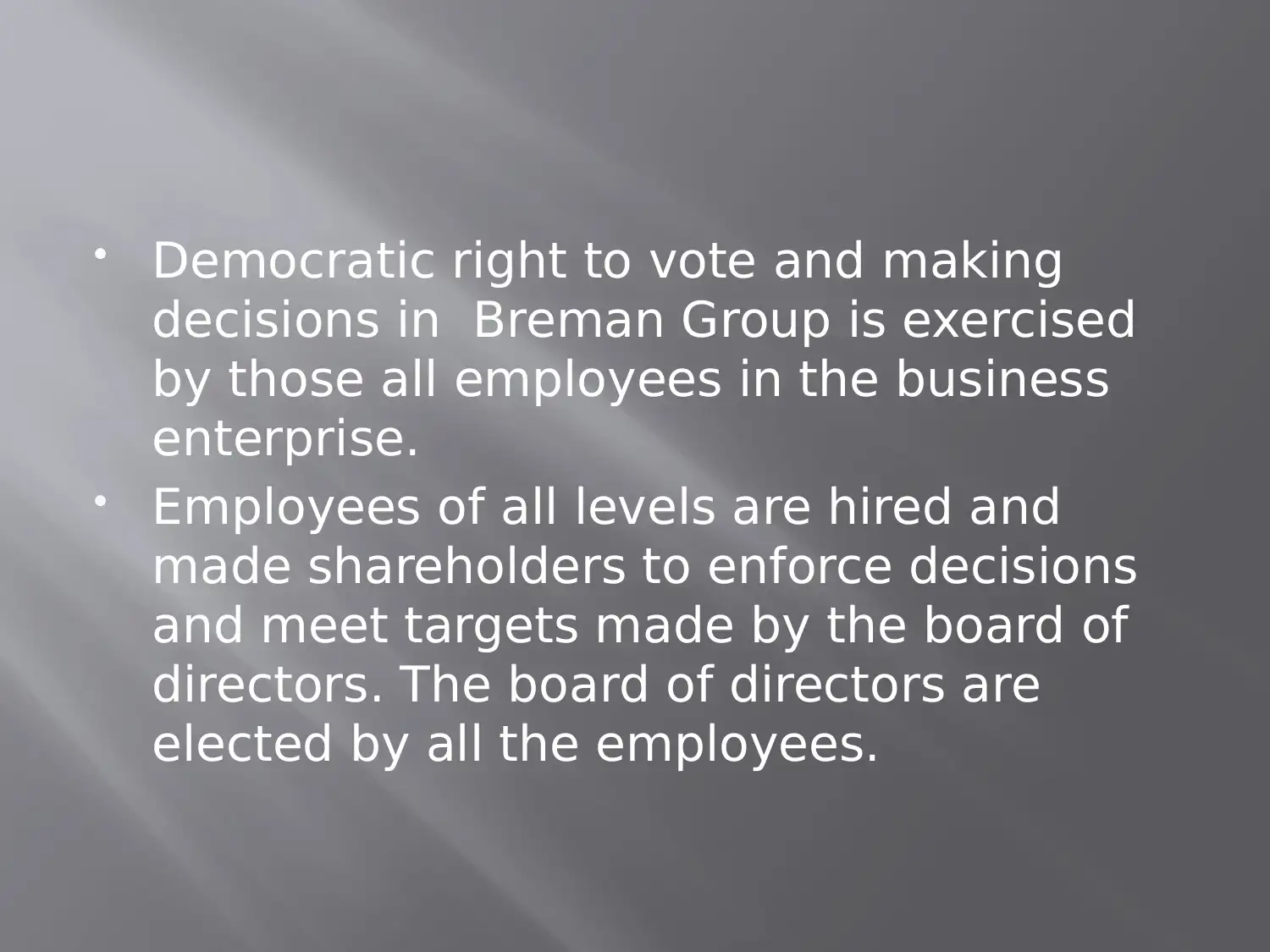
Democratic right to vote and making
decisions in Breman Group is exercised
by those all employees in the business
enterprise.
Employees of all levels are hired and
made shareholders to enforce decisions
and meet targets made by the board of
directors. The board of directors are
elected by all the employees.
decisions in Breman Group is exercised
by those all employees in the business
enterprise.
Employees of all levels are hired and
made shareholders to enforce decisions
and meet targets made by the board of
directors. The board of directors are
elected by all the employees.
Paraphrase This Document
Need a fresh take? Get an instant paraphrase of this document with our AI Paraphraser
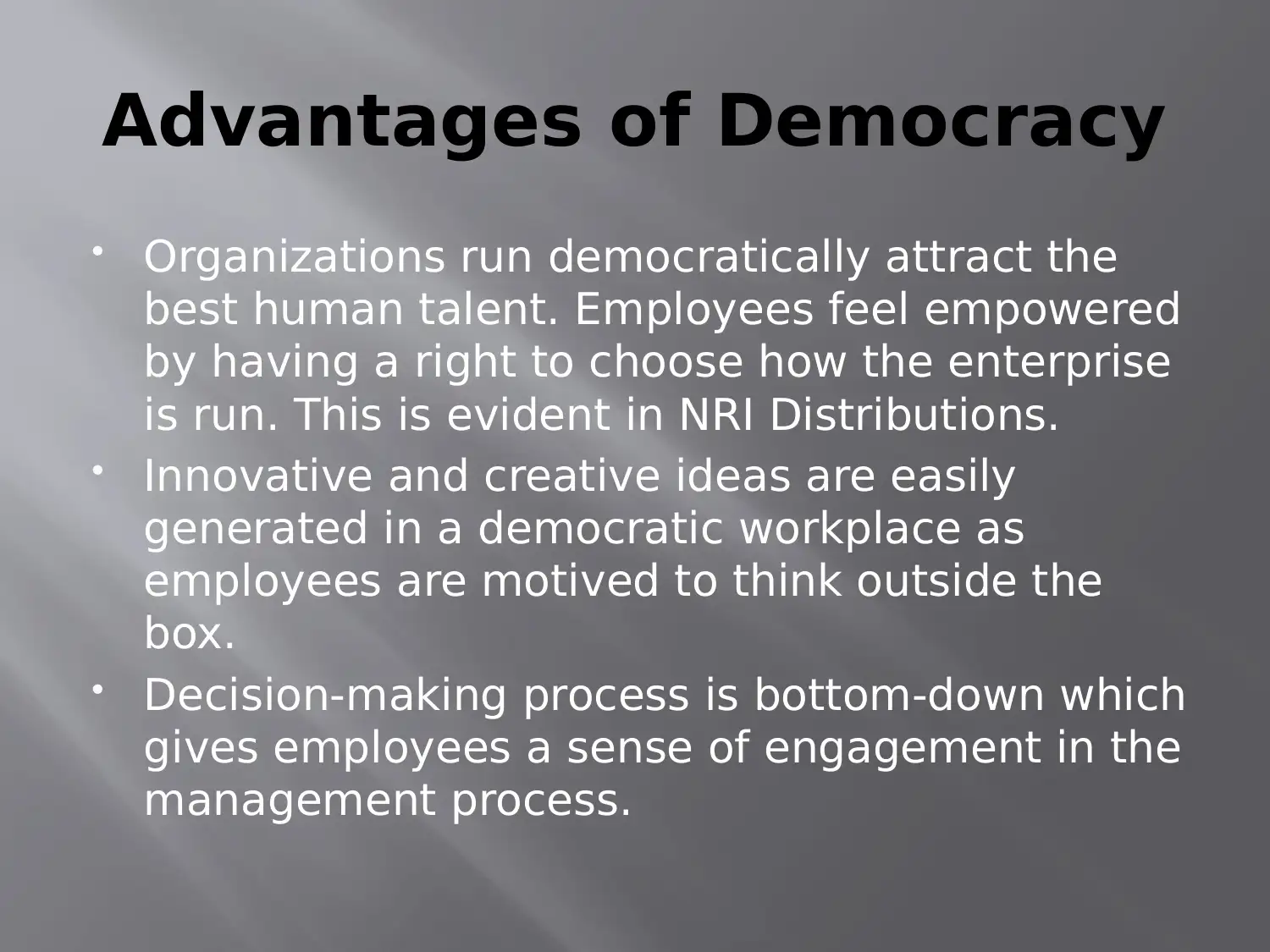
Advantages of Democracy
Organizations run democratically attract the
best human talent. Employees feel empowered
by having a right to choose how the enterprise
is run. This is evident in NRI Distributions.
Innovative and creative ideas are easily
generated in a democratic workplace as
employees are motived to think outside the
box.
Decision-making process is bottom-down which
gives employees a sense of engagement in the
management process.
Organizations run democratically attract the
best human talent. Employees feel empowered
by having a right to choose how the enterprise
is run. This is evident in NRI Distributions.
Innovative and creative ideas are easily
generated in a democratic workplace as
employees are motived to think outside the
box.
Decision-making process is bottom-down which
gives employees a sense of engagement in the
management process.
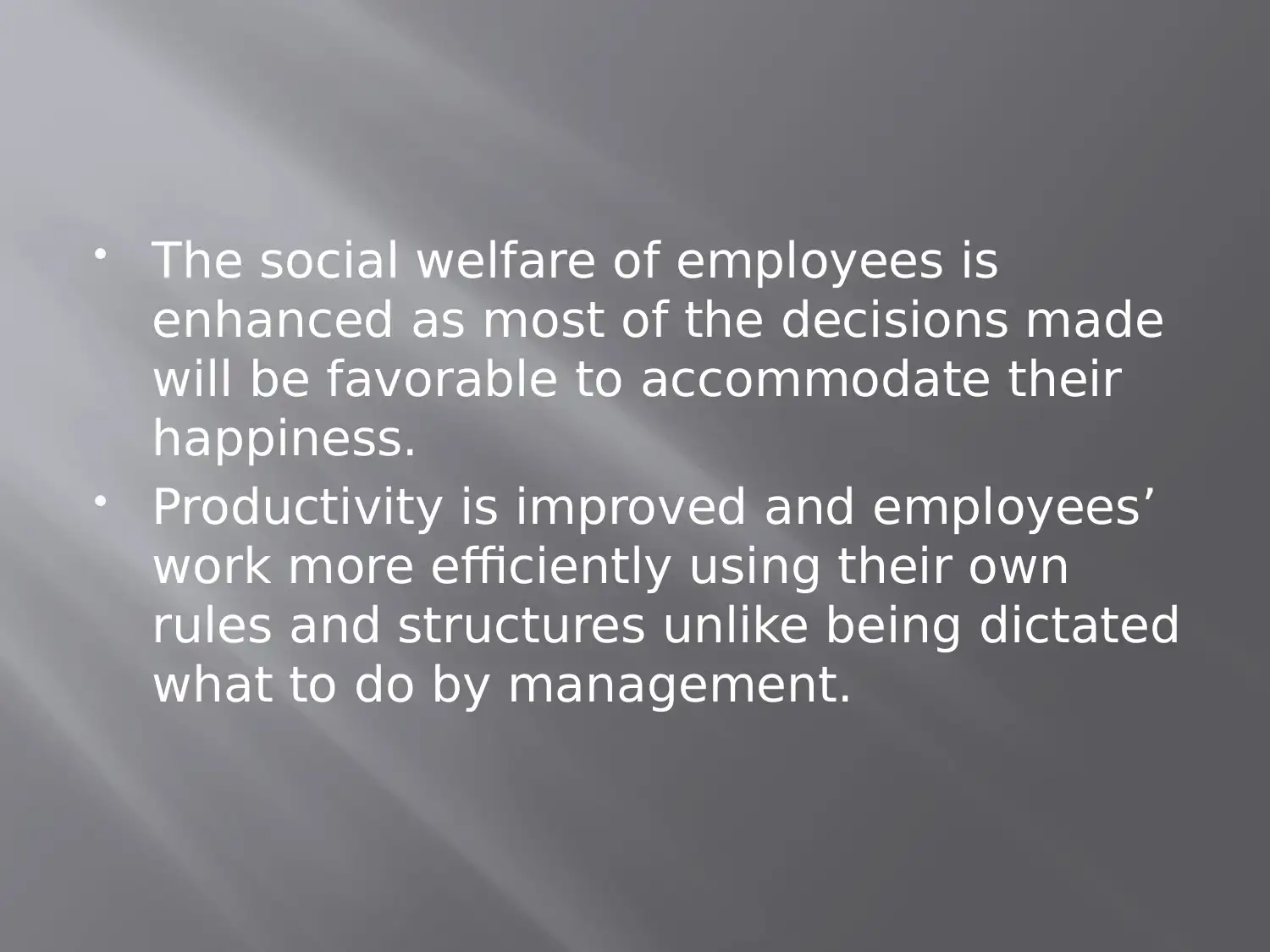
The social welfare of employees is
enhanced as most of the decisions made
will be favorable to accommodate their
happiness.
Productivity is improved and employees’
work more efficiently using their own
rules and structures unlike being dictated
what to do by management.
enhanced as most of the decisions made
will be favorable to accommodate their
happiness.
Productivity is improved and employees’
work more efficiently using their own
rules and structures unlike being dictated
what to do by management.
⊘ This is a preview!⊘
Do you want full access?
Subscribe today to unlock all pages.

Trusted by 1+ million students worldwide
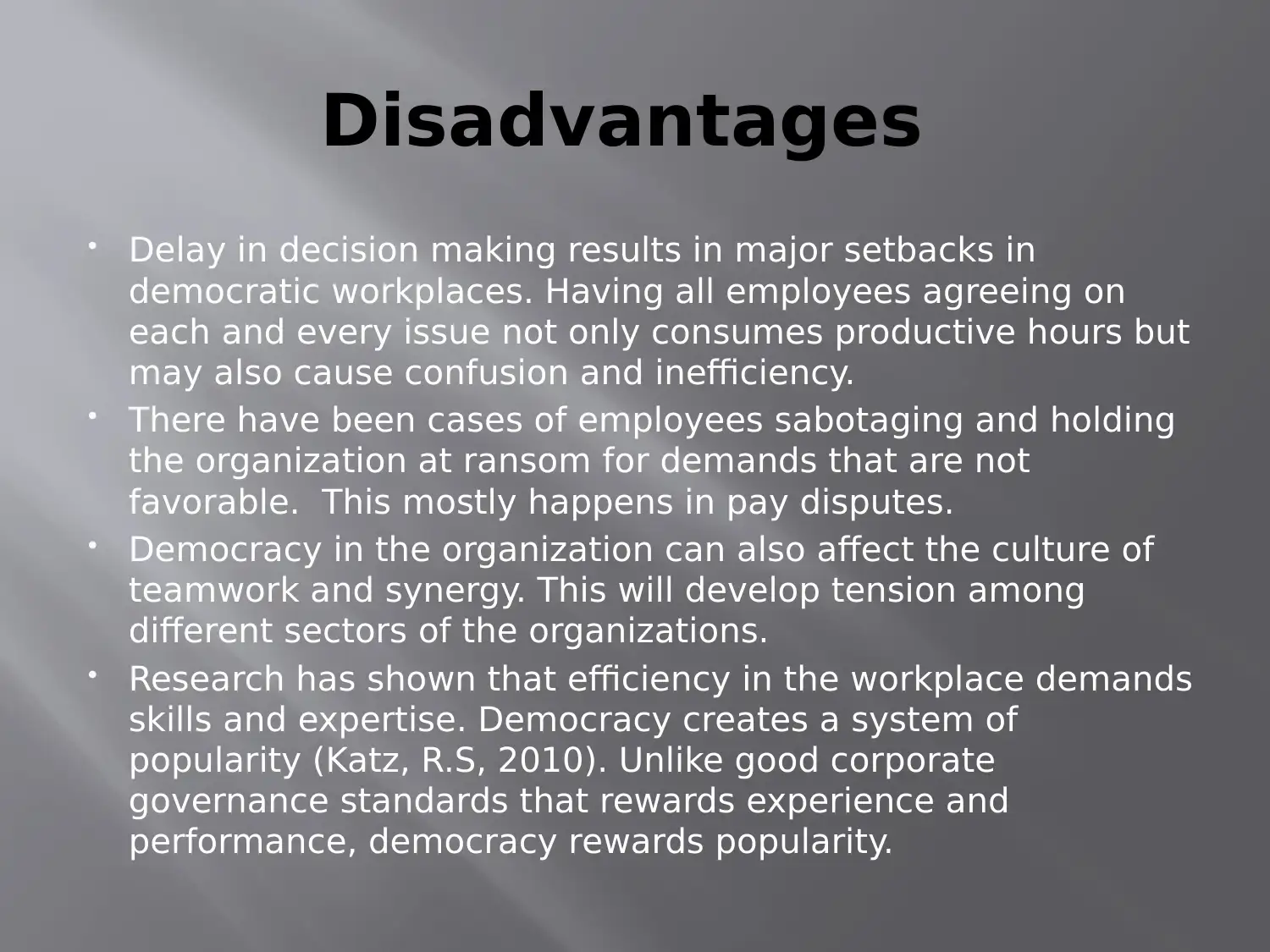
Disadvantages
Delay in decision making results in major setbacks in
democratic workplaces. Having all employees agreeing on
each and every issue not only consumes productive hours but
may also cause confusion and inefficiency.
There have been cases of employees sabotaging and holding
the organization at ransom for demands that are not
favorable. This mostly happens in pay disputes.
Democracy in the organization can also affect the culture of
teamwork and synergy. This will develop tension among
different sectors of the organizations.
Research has shown that efficiency in the workplace demands
skills and expertise. Democracy creates a system of
popularity (Katz, R.S, 2010). Unlike good corporate
governance standards that rewards experience and
performance, democracy rewards popularity.
Delay in decision making results in major setbacks in
democratic workplaces. Having all employees agreeing on
each and every issue not only consumes productive hours but
may also cause confusion and inefficiency.
There have been cases of employees sabotaging and holding
the organization at ransom for demands that are not
favorable. This mostly happens in pay disputes.
Democracy in the organization can also affect the culture of
teamwork and synergy. This will develop tension among
different sectors of the organizations.
Research has shown that efficiency in the workplace demands
skills and expertise. Democracy creates a system of
popularity (Katz, R.S, 2010). Unlike good corporate
governance standards that rewards experience and
performance, democracy rewards popularity.
Paraphrase This Document
Need a fresh take? Get an instant paraphrase of this document with our AI Paraphraser
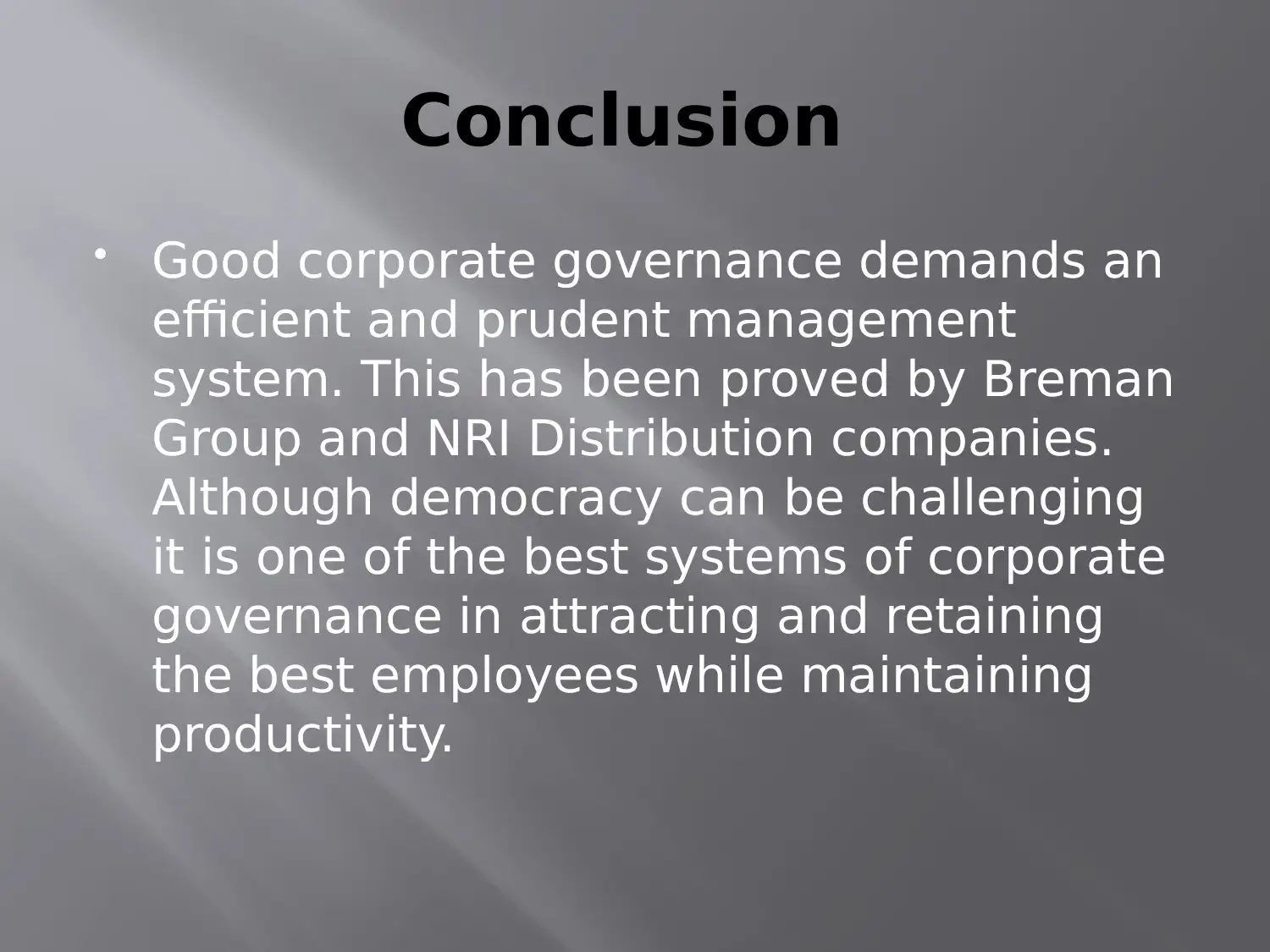
Conclusion
Good corporate governance demands an
efficient and prudent management
system. This has been proved by Breman
Group and NRI Distribution companies.
Although democracy can be challenging
it is one of the best systems of corporate
governance in attracting and retaining
the best employees while maintaining
productivity.
Good corporate governance demands an
efficient and prudent management
system. This has been proved by Breman
Group and NRI Distribution companies.
Although democracy can be challenging
it is one of the best systems of corporate
governance in attracting and retaining
the best employees while maintaining
productivity.
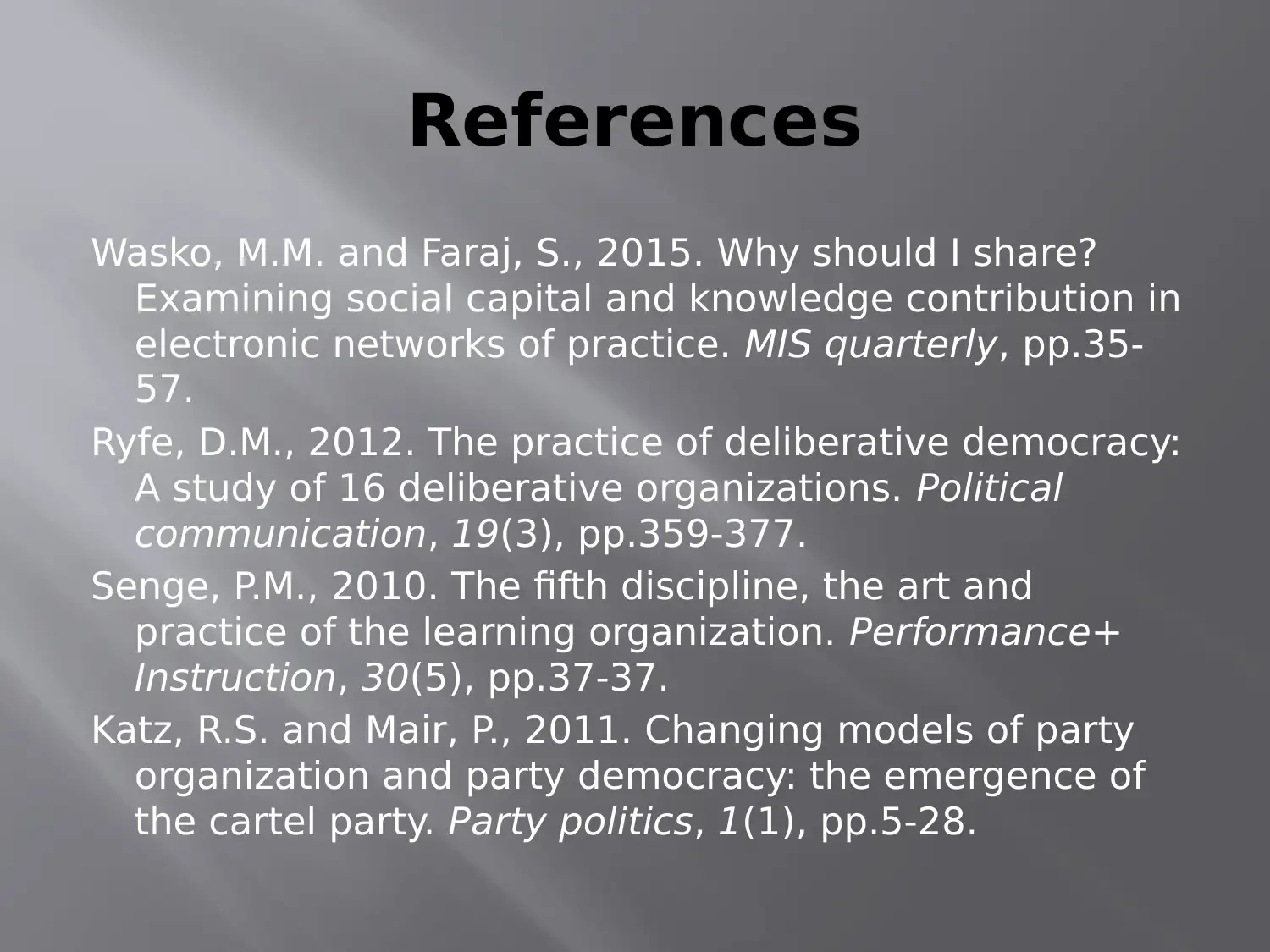
References
Wasko, M.M. and Faraj, S., 2015. Why should I share?
Examining social capital and knowledge contribution in
electronic networks of practice. MIS quarterly, pp.35-
57.
Ryfe, D.M., 2012. The practice of deliberative democracy:
A study of 16 deliberative organizations. Political
communication, 19(3), pp.359-377.
Senge, P.M., 2010. The fifth discipline, the art and
practice of the learning organization. Performance+
Instruction, 30(5), pp.37-37.
Katz, R.S. and Mair, P., 2011. Changing models of party
organization and party democracy: the emergence of
the cartel party. Party politics, 1(1), pp.5-28.
Wasko, M.M. and Faraj, S., 2015. Why should I share?
Examining social capital and knowledge contribution in
electronic networks of practice. MIS quarterly, pp.35-
57.
Ryfe, D.M., 2012. The practice of deliberative democracy:
A study of 16 deliberative organizations. Political
communication, 19(3), pp.359-377.
Senge, P.M., 2010. The fifth discipline, the art and
practice of the learning organization. Performance+
Instruction, 30(5), pp.37-37.
Katz, R.S. and Mair, P., 2011. Changing models of party
organization and party democracy: the emergence of
the cartel party. Party politics, 1(1), pp.5-28.
⊘ This is a preview!⊘
Do you want full access?
Subscribe today to unlock all pages.

Trusted by 1+ million students worldwide
1 out of 9
Related Documents
Your All-in-One AI-Powered Toolkit for Academic Success.
+13062052269
info@desklib.com
Available 24*7 on WhatsApp / Email
![[object Object]](/_next/static/media/star-bottom.7253800d.svg)
Unlock your academic potential
© 2024 | Zucol Services PVT LTD | All rights reserved.





